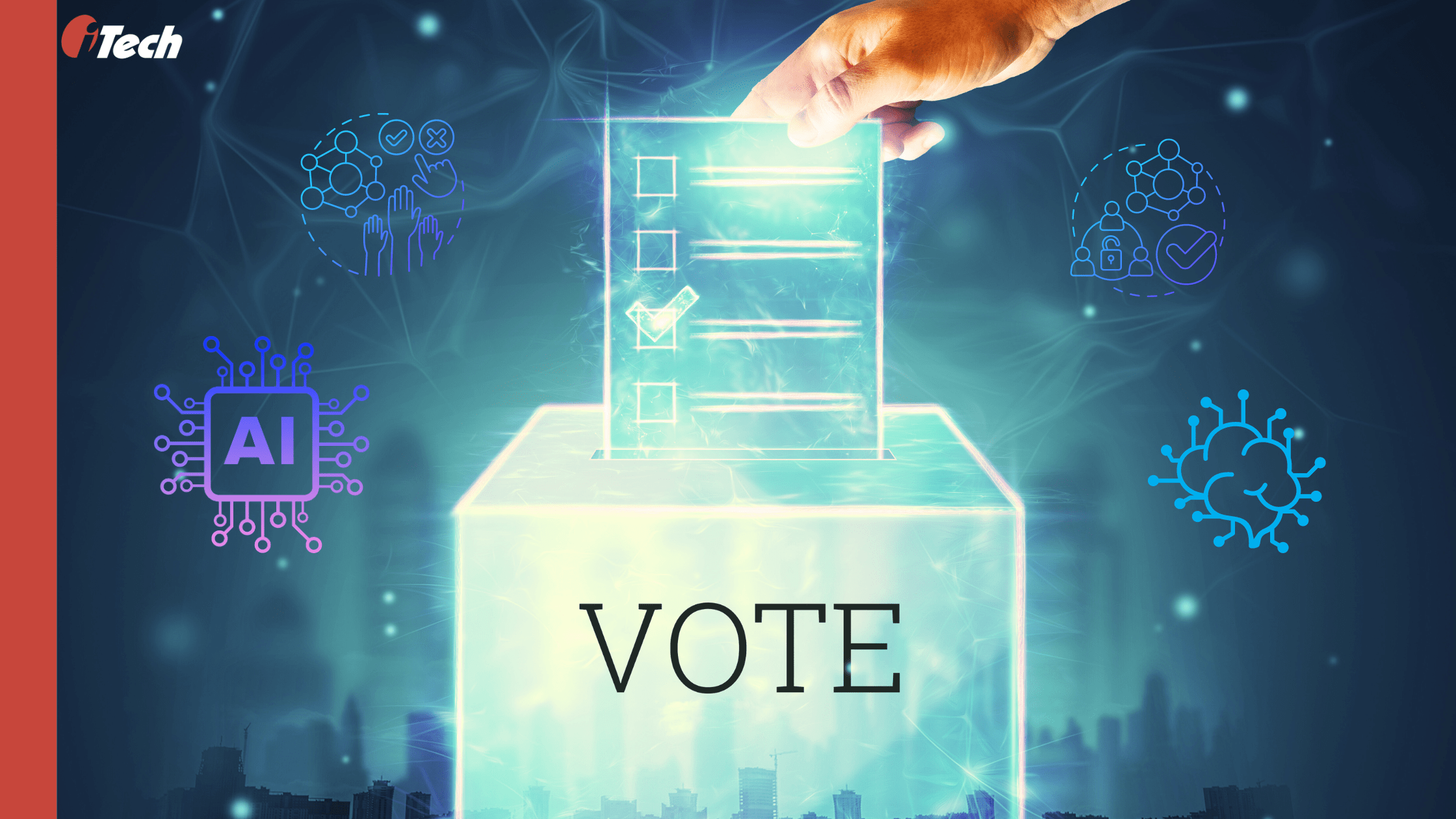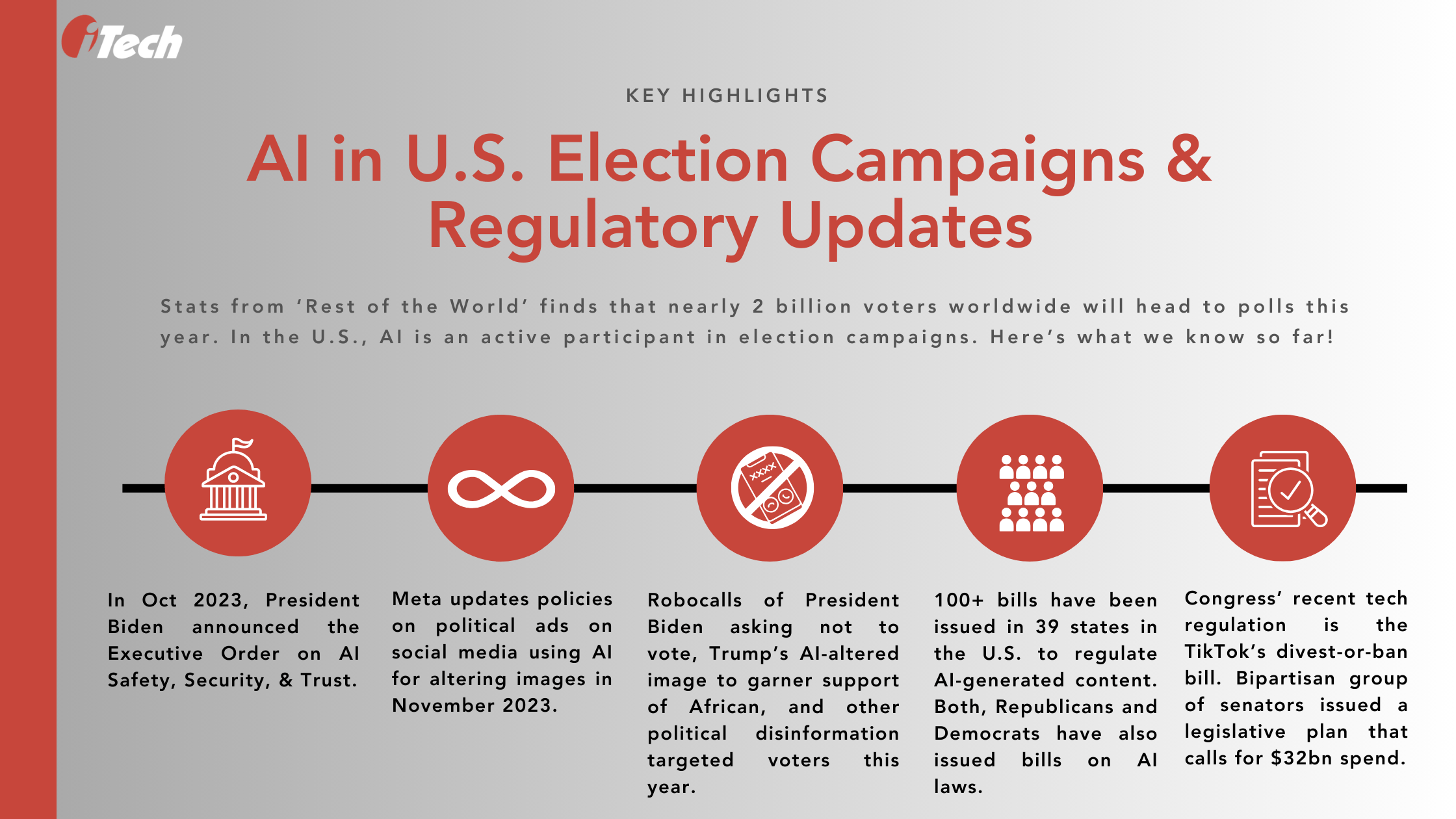How will the U.S. Elections impact AI Regulations?

What’s common between the Democrats and Republicans besides contesting for U.S. elections? The answer is both parties agree on guard railing AI!
2024 will be known for the global election marathon. AI is fueling the divide among the voters, and threat actors are weaponizing GenAI to spread misinformation. Amid the ongoing AI fever, what are the Democrats’ and Republicans’ plans and strategies to put reins over AI usage?
How will the results of the 2024 U.S. election cycles in November impact big tech, particularly AI policymaking? Let’s find out in the rest of this blog.
ITech GRC is a renowned IBM RegTech partner with decades of experience helping enterprises keep up with the changing regulatory and compliance requirements. As experts at implementing the AI-powered OpenPages with Watson platform, we address end-to-end GRC requirements and help firms adopt a compliance-by-design approach by improving their risk awareness.
As GRC platform implementation partners, we do not replace regulations, but we help our clients ace them by embracing even the minute trends in the regulatory world.
Existing AI Regulations are Incomplete
Recent stats by the Rest of World suggest that more than 2 billion voters across 50 countries will head to polls this year. 2024 will be a landmark year due to its embarkment on an AI-led journey to motivate and engage with voters. But the downside of this thriving technology is the spreading of disinformation, the creation of deepfakes, and random robocalls impersonating election candidates with deceptive messages. President Biden’s executive order on safe, secure, and trustworthy AI regulations guides at the federal level. However, these regulations are far behind the speed at which AI and GenAI are abused in political settings. The perils of AI are demanding regulatory and legal interventions.
Even the findings from the AI Policy Institute says that the majority of the voters have a preference for candidates who support regulating AI. Over a dozen bills were proposed last year, and many are being created to address the use of AI across real-world scenarios in border security, nuclear-related decisions, to agriculture. These bills come from both Republicans and Democrats. The bipartisan support for AI regulations represents the urgency to pass meaningful AI regulations. Because the existing rule on AI in the U.S. is at best, a work-in-progress!
Republicans & Democrats’ AI Bills: What’s the Difference
According to the Handbook on Applied AI Ethics on U.S. Regulations of AI, the Democrats are concerned about general ethics and fairness in AI. The Republicans are concerned about enhancing AI capabilities, citizens’ data privacy rights, and national security. The research also finds a higher proclivity of the Democrats in introducing bills.
Conversely, the poll results from the AI Institute found that both parties favored different themes for AI bills. The Republicans showed less favor towards regulating AI as opposed to the Democrats. The former group expressed concerns about the adversarial impacts of AI on the ‘working class’.
Currently, the world is scrutinizing AI for inherent biases and discriminatory models that can increase stereotypes and widen social gaps. There have also been several high-profile cases of unfairness in AI across industries. In healthcare AI-driven diagnosis systems results have been less accurate for underrepresented communities. A tech giant’s natural language processing algorithms for hiring targeted only male applicants that specifically used terms like ‘executed’ or ‘captured’ in the resume. A search engine leader’s online advertising systems displayed high-profile job roles to males compared to female users. AI-powered predictive policing systems have been accused of racial profiling and targeting minority communities. Themes like hiring discrimination, data privacy rights, and racial profiling are important data points at the federal level.
However, congress has yet to announce its take on AI-related concerns or pass bipartisan laws in the Senate. Federal agencies and regulators are picking up the pieces. Companies like Microsoft, Meta, OpenAI, and others have signed voluntary commitments to ensure their AI products are safe and uphold the highest standards to make sure their innovation doesn’t come at the cost of citizens’ rights and safety. Beyond self-regulations from AI makers, users and citizens demand comprehensive AI legislation.
How the 2024 U.S. Elections Affect AI Regulations?

Suppose President Biden is re-elected as the new president this November 5th. In that case, it is possible to expect a broader policy expansion in technology areas, such as investment in public infrastructure such as broadband and semiconductor manufacturing. Both parties share similar interests in these areas and issued the 2022 CHIPS and Science Act in its favor.
The new administration under Biden would strengthen regulation without Congress’ support, and the chances are the AI regulations will not go beyond executive order status. Or Congress will have to pass a separate federal privacy law. It could mean the Federal Trade Commission (FTC) or the U.S. Department of Justice will have to bring cases against large tech companies for antitrust violations.
However, the administration will adhere to China policy to prevent the acquisition option of tech advancement and retain the U.S.’s status as status as a competent rival. Achieving this may require getting some allies to agree with the policy.
AI Regulations Under Trump’s Regulations After U.S. Elections
If Trump wins the election, his administration will share the same objectives regarding U.S. and China policy. However, it will be adopted differently and predicted to be unilateral without the involvement of other countries.
Trump’s 10% tariff on all imports proposals are expected to create further rifts with ally nations and affect tech companies like Apple with a manufacturing base abroad.
According to the sources, the Trump administration is undecided about how to use executive agencies. The Republican’s reportedly easy-going approach on issues like competition and lesser regulatory scrutiny, or Trump may target the companies for personal reasons, makes his policy ad hoc compared to Biden’s. His take on stricter immigration targets the H-1B visa used by tech companies in the U.S. to recruit global talent. It may further affect the U.S. tech industry, fraught with labor shortages.
It is difficult to conclude how Trump’s reelection would impact AI accurately. As per sources, he has publicly expressed the technology as dangerous and scary. Recently, many Republican attorneys general opposed the Biden administration’s October 2023 Executive Order on AI, suggesting we need to tighten our expectations on AI regulations under Trump’s administration.
When We Hear AI, We Think Responsible and Explainable AI
The most recent update on this issue is the legislative plan for AI issued by the bipartisan group of senators. They issued a 20-page document, ‘Driving U.S. Innovation in Artificial Intelligence’ that also calls for $32 billion annual spending by 2026 for research and development efforts by the government and private entities. According to the lawmakers, creating a federal data privacy law that oversees the use of misleading technologies like deepfakes in election campaigns. They also stressed the need for AI regulations to protect against health and financial discrimination, job loss, and copyright violations from AI.
Additionally, the delay in building AI regulations in the U.S. will increase the divide from the EU’s AI Law released this year as a global benchmark for countries looking to leverage the technology and also avoid possible risks. The law is slated to undergo final checks before approval. But the U.S. is yet to act on crystalizing legislations on AI. Since the recent announcement to divest or ban TikTok bill, the congress has not passed any tech-related legislation.
We hear AI and we think of ethical, responsible, and explainable AI. The outcome of the U.S. elections is worth the wait. However, combining IBM’s trust principles and iTech GRC’s commitment towards empowering enterprises to embrace the latest industry trends, you can confidently leverage transformative power of AI in OpenPages platform.
You can learn more about OpenPages Watsonx.governance to comply with the latest AI governance standards.
Let’s get you connected to our experts to plan your GRC goals for 2024.
